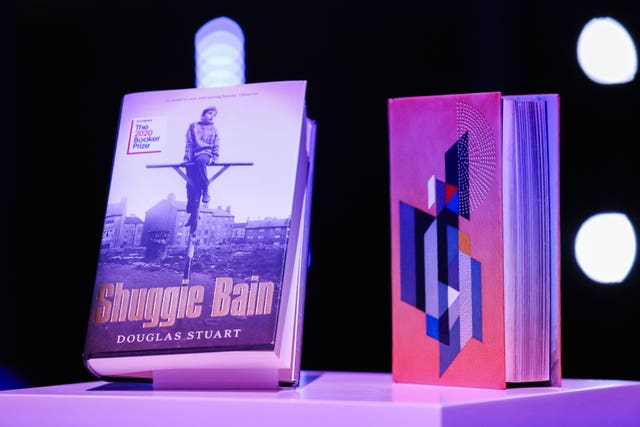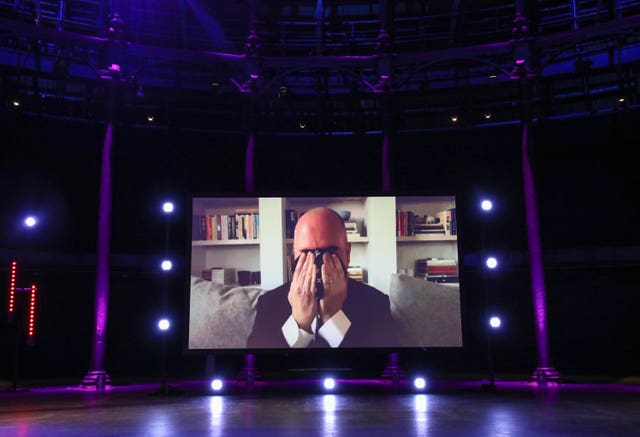Douglas Stuart has said his Booker Prize win “means a lot” for regional voices and working-class stories.
This year’s judges unanimously chose the Scottish writer to win the award.
The 44-year-old was announced as the winner of the prize in a virtual ceremony which featured contributions from former US president Barack Obama and the Duchess of Cornwall.
Shuggie Bain, which is based on Stuart’s childhood, is set in Glasgow in the 1980s and tells the story of a young boy growing up with a mother who is battling addiction.
In his acceptance speech, Stuart said: “I know I’m only the second Scottish book in 50 years to have won and that means, I think, a lot for regional voices, for working-class stories, so thank you.
“Thank you to the people of Scotland, especially Glaswegians, whose empathy and humour and love and struggle are in every word of this book.”
He added: “To all the readers who have just come out and let me know that Shuggie and Agnes have touched their lives, I can’t believe this, but the greatest gift is just to be able to connect with you.”
He also thanked his late mother, who died when he was 16, after being announced as the winner of the prize.
“My mother is in every page of this book and without her, I wouldn’t be here and my work wouldn’t be here.”
The winner of The 2020 Booker Prize is @Doug_D_Stuart with his debut novel, Shuggie Bain! Follow the link to hear the winner interview now: https://t.co/T5QkjZPnYb #2020BookerPrize @picadorbooks @panmacmillan pic.twitter.com/aWgQkwyBMe
— The Booker Prizes (@TheBookerPrizes) November 19, 2020
Stuart said she “would be proud” and “thrilled” about his achievement.
He added that the prize has “changed my entire life”.
Stuart, who has worked in fashion in the US, said: “I always wanted to be a writer, so this is about fulfilling a dream that was furloughed.
“Young boys like me growing up in 80s Glasgow, this wasn’t anything I ever would have dreamt of and, in fact, I was sort of turned away from English and academia towards textiles, which was a much more employable trade.”

“It’s been about three years I have already been in that position, but this cements it.
“I have been waiting for this moment, I have been waiting for my writing to join the world and it really was a thing that I have been dying to do since I was a young boy.”
He added that the £50,000 prize money will help him to continue to write.
Margaret Busby, chair of the judging panel, described Shuggie Bain as “daring, frightening and life-changing”.
She added: “The heart-wrenching story tells of the unconditional love between Agnes Bain – set on a descent into alcoholism by the tough circumstances life has dealt her – and her youngest son.
“Shuggie struggles with responsibilities beyond his years to save his mother from herself, at the same time as dealing with burgeoning feelings and questions about his own otherness.
“Gracefully and powerfully written, this is a novel that has impact because of its many emotional registers and its compassionately realised characters.
“The poetry in Douglas Stuart’s descriptions and the precision of his observations stand out: nothing is wasted.”

The New Wilderness by Diane Cook, Real Life by Brandon Taylor and Tsitsi Dangarembga’s This Mournable Body were also nominated.
Obama addressed the ceremony via a pre-recorded video message.
“I’ve always turned to writing to make sense of our world … and at their best Booker Prize-listed books remind me of fiction’s power to put ourselves in someone else’s shoes, understand their struggles, and imagine new ways to tackle complex problems and effect change,” he said.
“I want to salute the work of the Booker Prize Foundation to encourage people to read more fiction and promote the art of reading for the public benefit.”
The ceremony also saw the Duchess of Cornwall discuss the value of reading during the pandemic.

“And as long as we can read, we can travel, we can escape, we can explore, we can laugh, we can cry and we can grapple with life’s mysteries.
“For all these reasons, this year’s Booker Prize is even more important than usual.
“It celebrates wonderful writers who share their gifts to strengthen, provoke, move and comfort their readers.”
Stuart is the second Scottish writer to win the award after James Kelman scooped the 1994 prize for How Late It Was, How Late.

Last year’s prize was jointly won by Margaret Atwood’s The Testaments and Bernardine Evaristo’s Girl, Woman, Other.
The Booker Prize, first awarded in 1969, is open to writers of any nationality whose work is written in English and published in the UK or Ireland.






